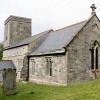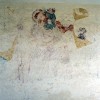Two men appeared at the Summer Assizes in Dorchester on the 15th of July 1749 to answer for their part in the plundering of the Dutch vessel Hope when it ran ashore on the Chesil on the 16th of January 1748, and resulted in ten days of lawlessness on the Chesil. One of those men was Augustine Elliott; we do not have the name of the other man.
Augustine Elliott was a Portland man. The son of John and Joan Elliott, he was baptised on the 25th of April 1696 and on the 4th of April 1716 he married Joan Mitchell. The couple had a daughter, Edith, baptised on the 15th of February 1717 but we haven’t found at Portland any other children from the marriage.
The charge against him was: “Feloniously stealing and carrying away ten ounces of gold and twenty ounces of silver from the ship called the Hope, the property of Hendrick Hogenbergh, merchant of Amsterdam, and others.”
Counsel for the prosecution said in his opening remarks: “My Lord and gentlemen of the jury, I am counsel for the Crown against the prisoner at the bar who stands indicted and charged with a crime of a very heinous nature. Considered in itself it is horrid and barbarous, contrary to the first principle of reason and impressions of humanity. Religion most severely threatens and condemns it. A crime it is which the laws of all civilised societies most strictly punish; a crime in its consequences highly prejudicial to the honour and commercial interest of the kingdom in general. And such in every respect as cries aloud to public justice to lift an avenging hand.”
Counsel went on to describe the conditions at sea and the lack of light from the Portland lighthouse that conspired to cause the Hope to run ashore and said of the people who went to the beach from Portland, Wyke and Weymouth “these people I’m sorry to say it, came not with dispositions of men, but with those of beasts of prey, They came for rapine and plunder.” Counsel said of Augustine Elliott he was “accustomed to prey and ravages of this kind” and described him as one of two men who led and organised the men on the beach into one “merciless battalion” and then sub –divided them into groups of twenty. The prosecution claimed: “In vain did the captain and his company in faltering foreign accents as well as they could “No wreck. The goods ours. Bring it to we and we will pay for it” – meaning the salvage.”
The court was told: “it seems the pillaging parties threw all they could snatch into one heap, for the security of which the prisoner at the bar (Elliott) was posted – as commander of an armed select party. As soon as the reflux of the sea had made the ship accessible, the scattered bands were again united – in a hostile manner armed with cutlasses, clubs, hooks and such like. They marched down to the ship swearing it was a wreck and if not so, they could make it a wreck. Shocking to relate!…the injury of strangers in distress is adding barbarity to iniquity and committing an act exceedingly sinful in the sight of both God and man.”
We learn from the court hearing that the captain with some of his crew made their way off the beach and took the goods they had managed to save to Fleet House, where they had hoped the King’s officers would help them. It seems they were disappointed. Counsel claimed in court: “They came indeed, but basely deserted their duty. Their behaviour was despicably timorous and infamously negligent.”
The description of the events to the court reached the point where there were thousands of people on the beach engaged in plunder when the forces of law and order determined to step in. Three Justices of the Peace with a well-armed group of men finally halted the wreckers and proceeded to search from house to house through the hamlets, villages and towns making many people surrender their ill-gotten gains to the agents of the ship’s owners. About £25,000 worth of goods were retrieved.
Elliott, it was claimed, was the principal organiser and the court was told “He was the muster-master, the treasurer, and divider of the prey amongst his plundering regiment.”
Captain Corneliz came to give evidence but was shy of saying how much his cargo was worth, saying only that it was rich and worth over £30,000. His command of English was not very good.
Next up was Bartholomew Cooper, officer of Customs at Portland. He told the court: “Early Monday morning I heard a loud talking in Chesil parish in Portland that a ship was on shore. I got up, but the thing being doubtful, I went and fed my horse with oats at a stable which was at some distance.” Copper was not a very co-operative witness and Counsel for the prosecution had to question him hard to get him to answer any question directly; we might be excused from thinking Cooper was on Augustine Elliott’s side.
It appears that once Cooper had determined there was a ship wreck, he and two other officers of Customs rode along the beach. Under questioning Cooper eventually told the court that there were at least 2,000 people digging and turning over the beach, the ship was pretty much dashed to pieces and he added “My business of surveying would not let me stay long.”
Further evidence was provided to the court that plainly supported Elliott. Another officer of Customs, Benjamin Roper, an officer in Portland quarries, told how he was at Schollard’s public house at Chesiltown when a great number of people clamoured for a division of the loot. Elliott, said Roper, was for keeping the money together till the owners called for it: “But within doors they insisted on sharing the money, as I was told, or else they would burn the house.”
Another witness, John Comben, gave similar testimony. He said “when bags were found they were hoisted on his horse and taken to a boat on the shore of the Fleet…” He said he did not see Elliott in the boat “but saw a man at some distance who mid or mid not be the prisoner. The Captain, I mind, did ask me for a bag but then I had none, The Tuesday after there were a great many of Weymouth, Wyke and Portland at Chesiltown to have the money divided. I did not see the prisoner at first myself but after I did and he said he was for keeping the money together till called for by the owners. But many threatened him, if the money were not divided, and accordingly, it was the next morning – it was £7 a piece.”
Elliott’s defence Counsel took this argument further. “We have several sufficient witnesses to prove,” he said, “that the prisoner in the whole affair acted an open and public spirited part. What he assisted in carrying away home was with an intention to save and not destroy; to preserve for the owners and not to steal and keep from them. On this generous fixed principle he not only acted himself but to his utmost laboured to bring the company he was concerned with to behave in the same humane and honest manner.”
The defence produced a receipt for the money Elliott was charged with stealing, it had been handed to the ship’s agents. The prosecution suggested the money had been brought in as an afterthought by his friends four days after Elliott was committed to stand trial and this was a ruse to mitigate the charges against him.
John Hutchins’ report of the trial reveals the defence had a second strand: arguing the Dutch were pirates who had argued amongst themselves over the division of their bounty and then deliberately ran the ship on shore and deserted her for fear of being taken and punished. The two argued that the Dutch had taken the goods from the Spaniards, who had bought and paid for them; thus they maintained it was lawful to plunder pirates.
Elliott’s trial lasted six hours and thirty minutes and the jury brought in a verdict of “NOT GUILTY”
Afterwards, Judge Baron Heneage Legge, commented: “As the nature of this in itself, and the penalties of the law, have been fully and plainly open in the preceding trials, so I am strongly inclined to hope these proceedings might have their proper design and influence, in causing crimes of this sort to cease amongst us.”
An anonymous reporter at the time wrote a layman’s summing up, saying: “As at a moderate computation 10,000 from all parts of the county, of farmers, tradesmen, labourers with one Lord of the Manor, have been concerned either in carrying away part of the property of this ship themselves, or in purchasing the same off them that did so; it is therefore far from being any matter of wonder to find the jury under a strong disposition to favour such, as were tried for offences of this kind.”



